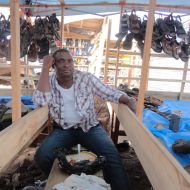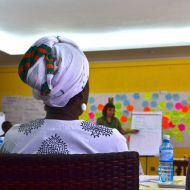Kenyan TV Show Skewers Politicians With Puppets to International Acclaim
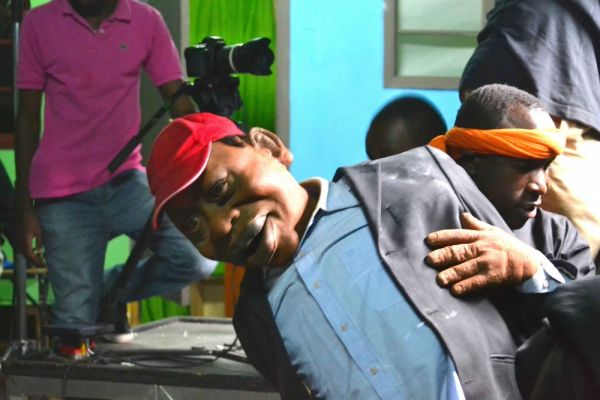
A puppeteer gets ready for his skit with President-Elect Uhuru Kenyatta. Photo Credit: Sam Sturgis
To Victor Oluoch, the political elites of Nairobi were always like the wizards behind the curtain — unseen, yet pulling the strings that left his sprawling slum of Kibera in squalid conditions.
High-ranking politicians and ministers owned title deeds to shanty homes bereft of basic needs, turning a significant profit by renting them to Nairobians desperate for any roof over their heads. Adequate schools and job initiatives, on the other hand – the rhetorical gems of every campaign stump aimed at Kibera’s many voters — never seemed to materialize. For young Victor, the slum was a treasure trove of resources for the powerful politicians who controlled it, but an albatross for a young man with aspirations to advance in life.
“When you grow up in a slum like Kibera, you don’t get many privileges,” he says. “You come back home and you never really get enough food.” Now in his early twenties, however, Oluoch is facing down those same elites who once made him feel powerless.
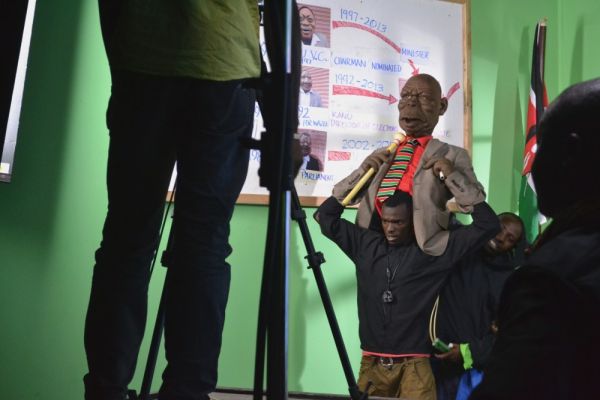
Victor Oluoch with former Kenyan dictator Daniel arap Moi. Photo credit: Sam Sturgis
In a large studio, bright lights are fixed on former Kenyan President Daniel arap Moi, his forehead protruding and his infamously shiny complexion gleaming. He stands in front of a board, detailing how numerous political appointees from his regime are now taking over the executive branch. Next up is Prime Minister Raila Odinga, fresh off his presidential loss to Uhuru Kenyatta during the elections last month. Odinga and Kenyatta sit across from one another at a poker table, a half-full bottle of brandy placed between them as Kenyatta’s celebratory cigar smoke fills the air. Odinga is arguing that the election was stolen, throwing down poker cards to show that he hasn’t finished playing his hand.
Representing Kenya’s unorthodox political relationships, the fact that the characters before us are all puppets only adds weight to the metaphor.
“After I finished high school I didn’t have a job, so I started doing theater projects in Kibera,” Oluoch recalls. After working on a number of acting programs that tackled social issues within the slums, most notably rape and violence against women, Oluoch made his way into a profession not normally associated with upward mobility: puppetry. Puppetry, he says, is often overlooked in the theater industry, yet it’s launched him out of Nairobi’s largest informal settlement and onto one of Kenya’s most popular TV shows.
An episode of “The XYZ Show” riffs on the MTV program “Cribs” to satirize the wealth of Kenyan Prime Minister Raila Odinga. Click here to view more episodes.
The XYZ Show, produced in Nairobi, uses puppetry to give the Kenyan public an opportunity to laugh at a political class that has a history of corruption and elitism. Roger Gichuhi, the show’s Digital Business Developer, says XYZ uses satire and humor to tackle daily issues such as political bickering, corruption and other democratic issues facing the country. It aims to raise political awareness as well as educate Kenyans about holding their leaders accountable and being aware of their constitutional rights.
The weekly show is currently filming its seventh season. When the African Magic Viewers Choice Awards were held in Nigeria last month, The XYZ Show took home the coveted “Best Television Series” award – as in, best series on the entire African continent. Quite a distinction for a show that likely would have been banned under Kenya’s last president, as well as for a program that relies solely on actors who, frankly, don’t actually exist.
Most of the unseen puppeteers behind the show come from Nairobi’s informal settlements – the very people who have traditionally been subject to the greatest political manipulation. The XYZ Show presents them an avenue to expose just how out of touch Kenya’s political class is with the everyday Nairobian – especially people like the puppeteers, who were born and raised in areas that remain unrecognized in the eyes of the government.
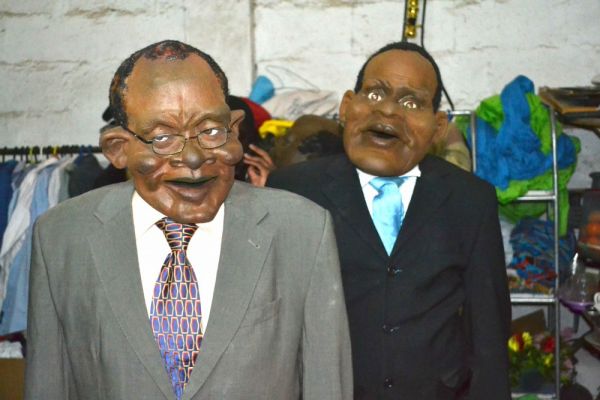
“The XYZ Show” uses puppet portrayals of Kenya’s political elites to satirize public affairs. Photo credit: Sam Sturgis
“I’m proud of what we’re doing because there was really never a show like this before,” says Elijah Njenga, an XYZ puppeteer who found a love for the craft while working in Kibera over ten years ago. “We do entertain, but we also educate about the political issues going on.” Nevertheless, many of the XYZ puppeteers don’t see the show as their only opportunity to raise political awareness. In fact, many of them are returning to their informal settlements during their days off, armed with the puppets that have given them an influential voice in the city’s political arena.
“Many of Kibera’s residents remain uneducated and don’t know their rights, so we use puppetry as a way to inform them,” says Njenga, adding that he and a number of the XYZ puppeteers have conducted “Puppets Against Corruption” and “Puppets for Good Governance” shows within the city’s slums, to wide acclaim.
The journey of these puppeteers – from one of Africa’s largest slums to its most respected TV program – has been a surprise even to many of them.
“I remember my first day in primary school, they asked us what we wanted to be when we grow up. I can’t even remember what I said. I know it wasn’t a puppeteer,” laughs Oluoch.
You can sense his gratitude as he reflects on his profession now. In an unexpected twist, suddenly Kibera is the one pulling the strings.





